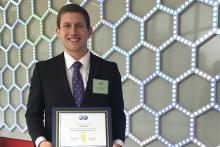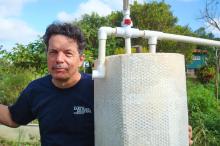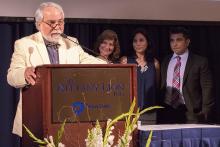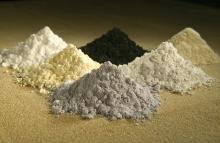Penn State researchers have received funding from the National Science Foundation to develop a system that will assist the power industry in siting new transmission lines to accommodate a broad range of possible future evolutions of the power grid.
A paper written by Evan Galimberti, a rising Penn State senior pursuing a bachelor’s degree in petroleum and natural gas engineering, and a master’s degree in energy and mineral engineering through an integrated undergraduate-graduate (IUG) program, won first place in the Eastern North America regional Society of Petroleum Engineers (SPE) student paper contest, held April 22 at the Ohio State University. Galimberti will advance to the final, international round of the contest, which will be held Oct. 9-11 at the SPE Annual Technical Conference and Exhibition in San Antonio.
Shimin Liu, Joseph Kreutzberger Early Career Professor and assistant professor of energy and mineral engineering in the College of Earth and Mineral Sciences at Penn State, has been selected to receive one of the 2017 Freeport-McMoRan Career Development Grants from the Society for Mining, Metallurgy and Exploration.
The Human Health and the Environment seed grants for 2017 have been awarded to a pool of interdisciplinary researchers at Penn State. These seed grants were funded by eight separate Penn State research entities and institutes, which collectively contributed more than $500,000. “We had an exceptional pool of proposals from faculty across the university,” Tom Richard, director of the Institutes of Energy and the Environment, said. “The projects address emerging contaminants well as legacy environmental problems that seriously impact human health.”
- Hometown:
Tim Robinson said he joined the College of Earth and Mineral Sciences and the technology field at an exciting time, and his decades-long career at Penn State reflects the rapid pace of the budding technology's impact on education. He's even expanded his role in the college, teaching classes related to energy and sustainability. Robinson is retiring on June 30.
Turgay Ertekin, professor of petroleum and natural gas engineering, said in his 40 years as an educator at Penn State he's always tried to task his students with using their creativity and problem-solving skills to turn unknowns into knowns. Ertekin, a prolific researcher and educator, is retiring June 30.
In 2016, a team of Penn State and U.S. Department of Energy researchers discovered a cost-effective and environmentally friendly way to extract rare earth elements (REEs) from coal and coal byproducts. Now, through a $1 million grant from DOE's Office of Fossil Energy, this research may be headed one-step closer to commercialization.
The minor in petroleum and natural gas engineering is for students interested in the drilling and production of oil and gas. It provides an opportunity for students to understand and appreciate the relationship between petroleum and natural gas demand, production and their environmental impact. Students are exposed to the basic courses in petroleum and natural gas extraction, particularly as they relate to drilling, production and characterization.
Careers
Graduates of this minor find rewarding careers across the globe as engineers for governmental and regulatory bodies, oil and gas producing companies, and other independent and service companies in the energy sector.









